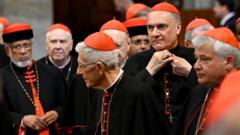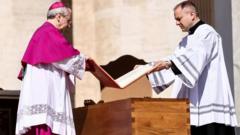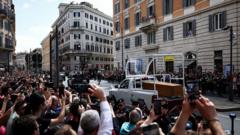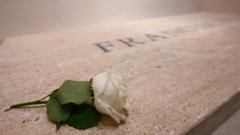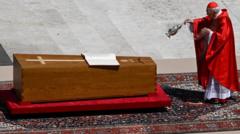As the Catholic Church flourishes in Africa, discussions emerge about representation in the papacy while addressing concerns about tokenism and racial dynamics.
**Could the Next Pope Emerge from Africa's Rapidly Growing Catholic Faith?**

**Could the Next Pope Emerge from Africa's Rapidly Growing Catholic Faith?**
The increasing Catholic population in Africa raises the question of whether the next pope could come from the continent.
In recent years, the global growth of the Catholic Church has been overwhelmingly concentrated in Africa, now housing approximately 281 million Catholics, amounting to 20% of the worldwide congregation. The continent, representing more than half of global Catholic population growth, has led many to speculate whether the next pope will be African, following the historical absence of papal leadership from the region since Pope Gelasius I over 1,500 years ago.
Father Stan Chu Ilo, a Nigerian Catholic priest, expressed optimism about the prospect of an African pope, arguing that it would better reflect the global church's demographic shift. However, he acknowledged the challenge posed by the lack of senior African clergy in prominent Vatican positions, which may sway the voting cardinals toward more established figures with global recognition.
Some names emerge as potential candidates. Cardinal Robert Sarah from Guinea, Cardinal Fridolin Ambongo Besungu from the Democratic Republic of Congo, and Cardinal Peter Turkson from Ghana are highlighted for their recent prominence in international Catholicism. Despite Pope Francis's efforts to increase representation—growing the percentage of cardinals from sub-Saharan Africa from 8% to 12% since 2013—there are still ongoing concerns about African clergy's influence within the Vatican.
Professor Paulinus Ikechukwu Odozor believes that selecting a pope based solely on their geographic origin borders on tokenism. He emphasizes that the pope's role transcends regional identities, centering around the responsibility to guide the entire Church and advocate for the faithful regardless of their location. In his view, ensuring African concerns are recognized requires more substantial engagement from the Vatican, as some in Africa feel marginalized in Church discussions.
Pope Francis is celebrated for advocating for marginalized communities and has been praised for his peacemaking efforts in conflict-ridden African nations. However, he has faced criticism from African bishops for his progressive stance on controversial issues such as LGBT rights. The Nigerian clerics mentioned prior hold conservative views, rejecting compromises on these matters.
Both Father Ilo and Professor Odozor point to underlying challenges, including concerns of racism within the Church that could impact the acceptance of a pope from Africa. Although Pope Francis appointed a majority of the voting cardinals, thereby influencing potential leadership directions, the unpredictable nature of the conclave means any speculation is ultimately uncertain.
As discussions continue, many hope for a leader who will foster connections with the impoverished and disenfranchised, aligning with Francis's legacy. The outcome remains uncertain, but the potential for an African pope is generating fervent dialogue within the Church and beyond.
Father Stan Chu Ilo, a Nigerian Catholic priest, expressed optimism about the prospect of an African pope, arguing that it would better reflect the global church's demographic shift. However, he acknowledged the challenge posed by the lack of senior African clergy in prominent Vatican positions, which may sway the voting cardinals toward more established figures with global recognition.
Some names emerge as potential candidates. Cardinal Robert Sarah from Guinea, Cardinal Fridolin Ambongo Besungu from the Democratic Republic of Congo, and Cardinal Peter Turkson from Ghana are highlighted for their recent prominence in international Catholicism. Despite Pope Francis's efforts to increase representation—growing the percentage of cardinals from sub-Saharan Africa from 8% to 12% since 2013—there are still ongoing concerns about African clergy's influence within the Vatican.
Professor Paulinus Ikechukwu Odozor believes that selecting a pope based solely on their geographic origin borders on tokenism. He emphasizes that the pope's role transcends regional identities, centering around the responsibility to guide the entire Church and advocate for the faithful regardless of their location. In his view, ensuring African concerns are recognized requires more substantial engagement from the Vatican, as some in Africa feel marginalized in Church discussions.
Pope Francis is celebrated for advocating for marginalized communities and has been praised for his peacemaking efforts in conflict-ridden African nations. However, he has faced criticism from African bishops for his progressive stance on controversial issues such as LGBT rights. The Nigerian clerics mentioned prior hold conservative views, rejecting compromises on these matters.
Both Father Ilo and Professor Odozor point to underlying challenges, including concerns of racism within the Church that could impact the acceptance of a pope from Africa. Although Pope Francis appointed a majority of the voting cardinals, thereby influencing potential leadership directions, the unpredictable nature of the conclave means any speculation is ultimately uncertain.
As discussions continue, many hope for a leader who will foster connections with the impoverished and disenfranchised, aligning with Francis's legacy. The outcome remains uncertain, but the potential for an African pope is generating fervent dialogue within the Church and beyond.

